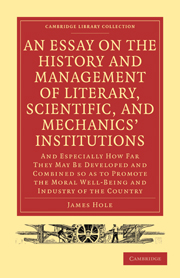 An Essay on the History and Management of Literary, Scientific, and Mechanics' Institutions
An Essay on the History and Management of Literary, Scientific, and Mechanics' Institutions UNION OF INSTITUTES.
Having referred to the method by which each Institution may individually be best improved and developed, we proceed to consider in what way the collective action of a number of Institutes may be made conducive to the same end. Here, as in everything else, system and organisation give power; and the more complete and perfect this is, the greater the advantages to the respective Institutes. If, indeed, a combination of them were incapable of reflecting any benefit on the individual Institutes, there would still be ample reasons why such an organisation should exist. It is important that some minds should be occupied in the work of inspection, and in securing the general advancement of those objects at which Mechanics’ and Literary Institutes aim. There should be men who, by their freedom from other occupation, position in life, superior culture, and strong sympathy with the cause of popular education, are fitted to watch over its general interests. They should at the same time be so familiar with the management of these institutions, as to give their labours a practical value.
The associations for diffusing knowledge among the people may, like the members of individual Institutes, derive stimulus and help from the sympathy of congenial pursuits.
To save this book to your Kindle, first ensure [email protected] is added to your Approved Personal Document E-mail List under your Personal Document Settings on the Manage Your Content and Devices page of your Amazon account. Then enter the ‘name’ part of your Kindle email address below. Find out more about saving to your Kindle.
Note you can select to save to either the @free.kindle.com or @kindle.com variations. ‘@free.kindle.com’ emails are free but can only be saved to your device when it is connected to wi-fi. ‘@kindle.com’ emails can be delivered even when you are not connected to wi-fi, but note that service fees apply.
Find out more about the Kindle Personal Document Service.
To save content items to your account, please confirm that you agree to abide by our usage policies. If this is the first time you use this feature, you will be asked to authorise Cambridge Core to connect with your account. Find out more about saving content to Dropbox.
To save content items to your account, please confirm that you agree to abide by our usage policies. If this is the first time you use this feature, you will be asked to authorise Cambridge Core to connect with your account. Find out more about saving content to Google Drive.